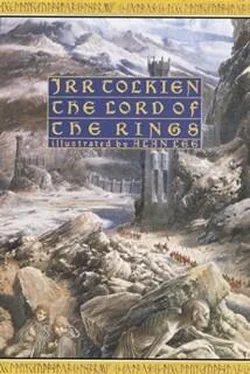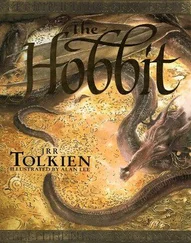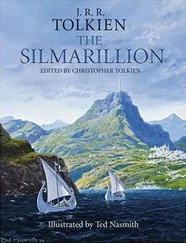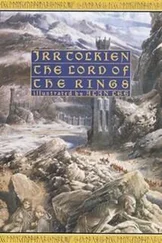John Tolkien - The Return of the King
Здесь есть возможность читать онлайн «John Tolkien - The Return of the King» весь текст электронной книги совершенно бесплатно (целиком полную версию без сокращений). В некоторых случаях можно слушать аудио, скачать через торрент в формате fb2 и присутствует краткое содержание. Жанр: Фэнтези, на английском языке. Описание произведения, (предисловие) а так же отзывы посетителей доступны на портале библиотеки ЛибКат.
- Название:The Return of the King
- Автор:
- Жанр:
- Год:неизвестен
- ISBN:нет данных
- Рейтинг книги:5 / 5. Голосов: 1
-
Избранное:Добавить в избранное
- Отзывы:
-
Ваша оценка:
- 100
- 1
- 2
- 3
- 4
- 5
The Return of the King: краткое содержание, описание и аннотация
Предлагаем к чтению аннотацию, описание, краткое содержание или предисловие (зависит от того, что написал сам автор книги «The Return of the King»). Если вы не нашли необходимую информацию о книге — напишите в комментариях, мы постараемся отыскать её.
The Return of the King — читать онлайн бесплатно полную книгу (весь текст) целиком
Ниже представлен текст книги, разбитый по страницам. Система сохранения места последней прочитанной страницы, позволяет с удобством читать онлайн бесплатно книгу «The Return of the King», без необходимости каждый раз заново искать на чём Вы остановились. Поставьте закладку, и сможете в любой момент перейти на страницу, на которой закончили чтение.
Интервал:
Закладка:
S
is always voiceless, as in English so , geese ; the z -sound did not occur in contemporary Quenya or Sindarin. SH, occurring in Westron, Dwarvish and Orkish, represents sounds similar to sh in English.
TH
represents the voiceless th of English in thin cloth . This had become in Quenya spoken s , though still written with a different letter; as in Q. Isil , S. Ithil , 'Moon'.
TY
represents a sound probably similar to the t in English tune . It was derived mainly from c or t+y . The sound of English ch , which was frequent in Westron, was usually substituted for it by speakers of that language. Cf. HY under Y.
V
has the sound of English v , but is not used finally. See F.
W
has the sound of English w . HW is a voiceless w , as in English white (in northern pronunciation). It was not an uncommon initial sound in Quenya, though examples seem not to occur in this book. Both v and w are used in the transcription of Quenya, in spite of the assimilation of its spelling to Latin, since the two sounds, distinct in origin, both occurred in the language.
Y
is used in Quenya for the consonant y , as in English you . In Sindarin y is a vowel (see below). HY has the same relation to y as HW to w , and represents a sound like that heard in English hew , huge ; h in Quenya eht , iht had the same sound. The sound of English sh , which was common in Westron, was often substituted by speakers of that language. Cf. TY above. HY was usually derived from sy- and khy- ; in both cases related Sindarin words show initial h , as in Q. Hyarmen 'south', S. Harad .
Note that consonants written twice, as tt , ll , ss , nn , represent long or 'double' consonants. At the end of words of more than one syllable these were usually shortened: as in Rohan from Rochann (archaic Rochand ).
In Sindarin the combinations ng , nd , mb , which were specially favoured in the Eldarin languages at an earlier stage, suffered various changes, mb became m in all cases, but still counted as a long consonant for purposes of stress (see below), and is thus written mm in cases where otherwise the stress might be in doubt 69 69 As in galadhremmin ennorath (I, 54) 'tree-woven lands of Middle-earth'. Remmirath (I, 54) contains rem 'mesh', Q. rembe , + mîr 'jewel'.
. ng remained unchanged except finally where it became the simple nasal (as in English sing ). nd became nn usually, as Ennor 'Middle-earth', Q. Endóre ; but remained nd at the end of fully accented monosyllables such as thond 'root' (cf. Morthond 'Blackroot'), and also before r , as Andros 'long-foam'. This nd is also seen in some ancient names derived from an older period, such as Nargothrond , Gondolin , Beleriand . In the Third Age final nd in long words had become n from nn , as in Ithilien , Rohan , Anórien .
For vowels the letters i, e, a, o, u are used, and (in Sindarin only) y . As far as can be determined the sounds represented by these letters (other than y ) were of normal kind, though doubtless many local varieties escape detection 70 70 A fairly widespread pronunciation of long é and ó as ei and ou , more or less as in English say no , both in Westron and in the rendering of Quenya names by Westron speakers, is shown by spellings such as ei, ou (or their equivalents in the contemporary scripts). But such pronunciations were regarded as incorrect or rustic. They were naturally usual in the Shire. Those therefore who pronounce yéni únótime 'long-years innumerable', as is natural in English (sc. more or less as yainy oonoatimy ) will err little more than Bilbo, Meriadoc, or Peregrin. Frodo is said to have shown great 'skill with foreign sounds'.
. That is, the sounds were approximately those represented by i, e, a, o, h in English machine , were, father, for, brute, irrespective of quantity.
In Sindarin long e, a, o had the same quality as the short vowels, being derived in comparatively recent times from them (older é, á, ó had been changed). In Quenya long ê and ó were, when correctly pronounced, as by the Eldar, tenser and 'closer' than the short vowels.
Sindarin alone among contemporary languages possessed the 'modified' or fronted u , more or less as u in French lune . It was partly a modification of o and u , partly derived from older diphthongs eu , iu . For this sound y has been used (as in ancient English): as in lyg 'snake', Q. leuca , or emyn pl. of amon 'hill'. In Gondor this y was usually pronounced like i .
Long vowels are usually marked with the 'acute accent', as in some varieties of Fëanorian script In Sindarin long vowels in stressed monosyllables are marked with the circumflex, since they leaded in such cases to be specially prolonged 71 71 So also in Annûn 'sunset', Amrûn 'sunrise', under the influence of the related dûn 'west', and rhûn 'east'.
; so in dûn compared with Dúnadan . The use of the circumflex in other languages such as Adûnaic or Dwarvish has no special significance, and is used merely to mark these out as alien tongues (as with the use of k ).
Final e is never mute or a mere sign of length as in English. To mark this final e it is often (but not consistently) written ë .
The groups er, ir, ur (finally or before a consonant) are not intended to be pronounced as in English fern , fir , fur , but rather is English air , eer , oor.
In Quenya ui, oi, ai and iu, eu, au are diphthongs (that is, pronounced in one syllable). All other pairs of vowels are dis-syllabic. This is often indicated by writing ëa, ëo, oë .
In Sindarin the diphthongs are written ae, oi, ei, oe, ui, and au . Other combinations are not diphthongal. The writing of final au as aw is in accordance with English custom, but is actually not uncommon in Fëanorian spellings.
All these diphthongs 72 72 Originally. But iu in Quenya was in the Third Age usually pronounced as a rising diphthong as yu in English yule.
were falling diphthongs, that to stressed on the first element, and composed of the simple vowels run together. Thus ai, ei, oi, ui are intended to be pronounced respectively as the vowels in English rye (not ray ), grey, boy, ruin : and au ( aw ) as in loud, how and not as in laud, haw .
There is nothing in English closely corresponding to ae, oe, eu ; ae and oe may be pronounced as ai, oi .
The position of the 'accent' or stress is not marked, since in the Eldarin languages concerned its place is determined by the form of the word. In words of two syllables it falls in practically all cases on the first syllable. In longer words it falls on the last syllable but one, where that contains a long vowel, a diphthong, or a vowel followed by two (or more) consonants. Where the last syllable but one contains (as often) a short vowel followed by only one (or no) consonant, the stress falls on the syllable before it, the third from the end. Words of the last form are favoured in the Eldarin languages, especially Quenya.
Читать дальшеИнтервал:
Закладка:
Похожие книги на «The Return of the King»
Представляем Вашему вниманию похожие книги на «The Return of the King» списком для выбора. Мы отобрали схожую по названию и смыслу литературу в надежде предоставить читателям больше вариантов отыскать новые, интересные, ещё непрочитанные произведения.
Обсуждение, отзывы о книге «The Return of the King» и просто собственные мнения читателей. Оставьте ваши комментарии, напишите, что Вы думаете о произведении, его смысле или главных героях. Укажите что конкретно понравилось, а что нет, и почему Вы так считаете.












